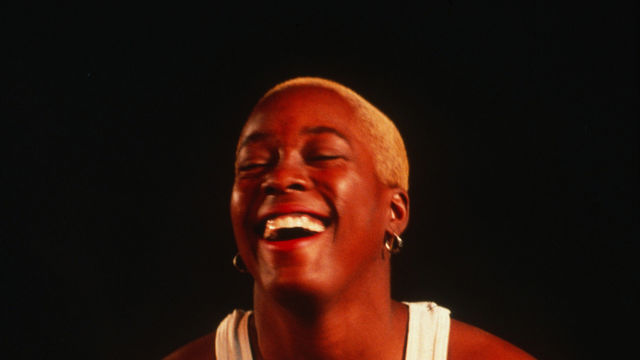
A Comedy in Six Unnatural Acts / The Watermelon Woman
- This is a past program
Part of the UCLA Film & Television Archive’s Pioneers of Queer Cinema screening series. Register at cinema.ucla.edu to attend this in-theater screening.
In-person: filmmaker Jan Oxenberg. Video Q&A with filmmaker Cheryl Dunye.
Restoration funded by The Andy Warhol Foundation for the Visual Arts, Hollywood Foreign Press Association, Jane Fonda Fund for Women Directors, and IndieCollect Donors Circle
A Comedy in Six Unnatural Acts
1975
This 1975 series of black and white vignettes interprets six stereotypes of lesbians as a series of standalone sketches worthy of a queerer, more experimental Saturday Night Live. The Wallflower, Role-Playing, Seduction, Non-Monogamy, The Child Molester, and The Stompin’ Dyke are satirical depictions of insults levied at lesbians, but writer-director Jan Oxenberg’s humor twists each ending into feel-good fun unseen in any mainstream filmic depiction of queer characters of the time. The short’s self-aware humor is buoyed by a cast and crew (pictured in the credits) of queer female artists and friends, whose authenticity combines with a shoestring production budget to deliver a genuine laugh at the expense of heterosexuality.
Since her first film, Home Movie (1973) which explores Oxenberg’s personal feelings surrounding her own coming out, Oxenberg (b. 1950) has been committed to creating work that always comes from an insider’s point of view, rather than a watered-down outside view of lesbian identity. With her background as one of the first members of the feminist art collective Womanhouse (along with Judy Chicago and Miriam Schapiro), and a former participant of the Education Liberation Front, Oxenberg brings wry, honest, and unexpected perspectives to all her film works, documentary and fiction alike. In addition to the deeply personal, internationally- praised Home Movie and her unusual documentary feature about the death and life of her grandmother, Thank You and Goodnight (1992), Oxenberg has been an active writer and producer in television. She lent her writing and producing prowess to such shows as Cold Case, Pretty Little Liars, and Chicago Hope; other highlights include her episode of Relativity which featured the first kiss between two queer women on prime-time television, and the creation of a lesbian teenage couple on Once and Again.
—Shayna Warner
DCP, color, 26 min. Director: Jan Oxenberg. Screenwriter: Jan Oxenberg. New 4K restoration by IndieCollect.
Preservation funded by 13th Gen, Outfest, The Andrew J. Kuehn Jr. Foundation, TIFF, First Run Features and Yves Averous
The Watermelon Woman
1996
Meticulously researched and expertly packaged for our viewing pleasure, The Watermelon Woman is the most inquisitive and entertaining docu-fiction about an essential queer, black figure that history forgot … because she didn’t actually exist.
With her first feature, The Watermelon Woman, writer-director-punk archivist-actor Cheryl Dunye (b. 1966) creates an entirely new form of blended fictional narrative, mockumentary, and archeological dig, theretofore known as the “Dunyementary.” As “Cheryl,” a 20-something video store employee with big dreams to open her own production company with her friend and co-worker Tamara (Valarie Walker), she ends up literally creating her own lineage. After becoming obsessed with the Black actress who keeps popping up in 1930s American films, only credited as “Watermelon Woman,” Cheryl sets out to create a documentary that will lead her to the identity of Fae Richards/Faith Richardson, with whom she feels an unexplained kinship. Along the way, she wades through a courtship with hot, politically tone-deaf Diana (lesbian film legend Guinevere Turner), which mysteriously echoes the same uncomfortable relationship Richards had with white “liberal” Martha Page (film scholar and Dunye’s girlfriend at the time, Alexandra Juhasz).
In order to produce her investigative mockumentary slash romantic dramedy about the uncovering of Richards/Richardson, Dunye and artist Zoe Leonard brilliantly created a series of 78 prints detailing the actress’ life. Dunye drew on the historical reality of such institutions the Lesbian Herstory Archives, the June L. Mazer Archives, public universities, and the Library of Congress in order to stage her mockumentary’s authenticity, and raise money for the creation of the shoestring-budget film. In not only drawing from historical artifacts, but creating an entirely new artifact to re-insert into Hollywood’s history, The Watermelon Woman expands the possibilities of recorded history, and creates a classic of New Queer Cinema in the process.
—Shayna Warner
DCP, color, 90 min. Director: Cheryl Dunye. Screenwriter: Cheryl Dunye. With: Cheryl Dunye, Guinevere Turner, Valarie Walker, Lisa Marie Bronson.
Preserved by the UCLA Film & Television Archive and 13th Gen.







